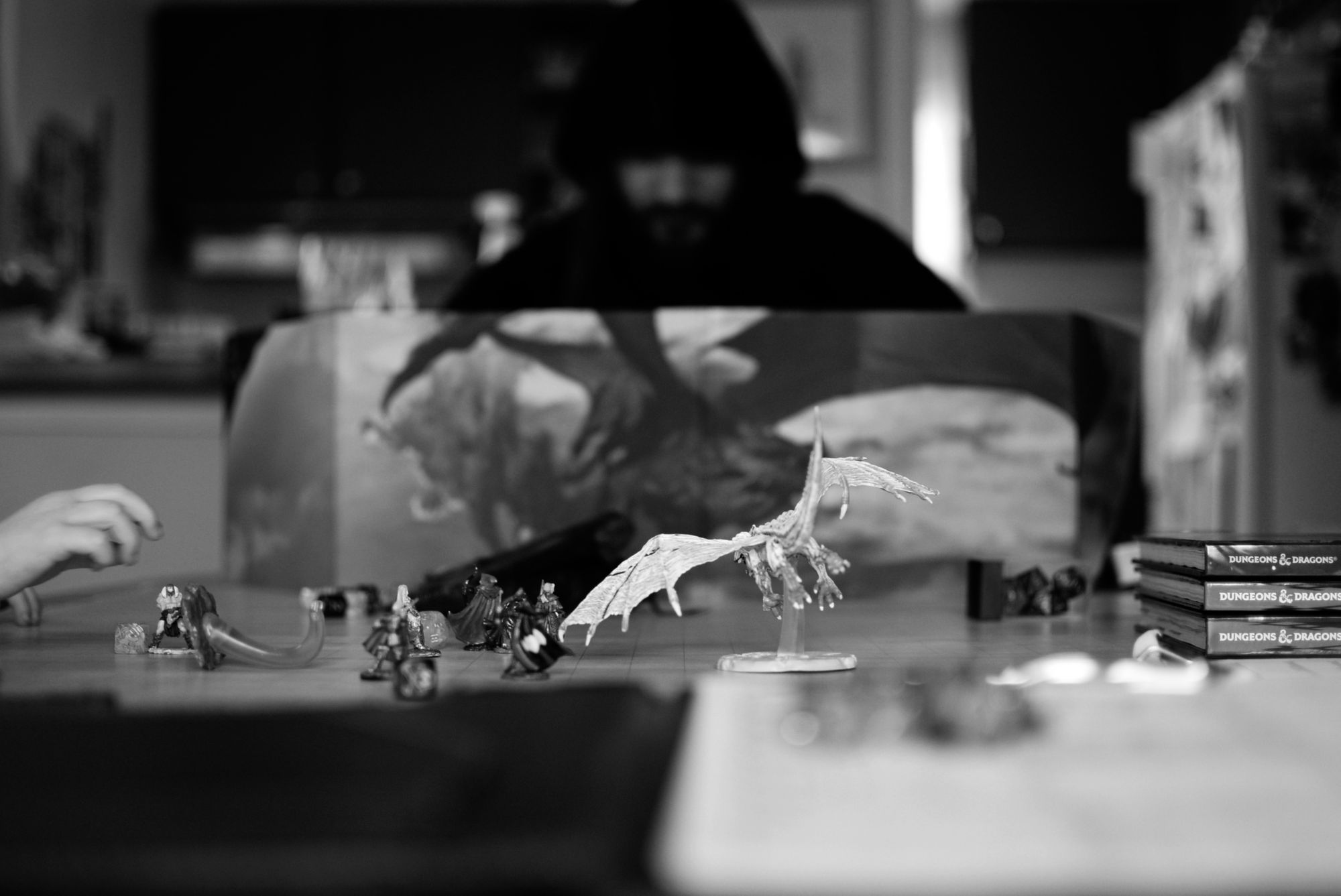Every Monday night, my husband Garrick retreats to the back room and spends the evening casting spells as a human wizard named Christopher Joggins.
‘Joggins’ usually shows up early Monday, delivering monologues during breakfast, researching incantations over lunch, and reminding the kids that “the family that slays together, stays together” throughout the day. We've come to regard Joggins fondly, and look forward to opportunities to interact with him, though we may never admit it. Garrick has coined this “Mental Health Monday”, and usually dedicates time to playing both Magic the Gathering and D&D (Dungeons & Dragons).
It is his weekly reset, a time to step back from being ‘dad’ and ‘husband’ for a moment and connect to himself and his community. He says, “I would go absolutely bonkers if I didn’t have a creative outlet like that to express myself.”
RPGs (role playing games) and tabletop gaming are a mode of interaction with far greater rewards than simply providing entertainment. In fact, many counselors are using RPGs and other tabletop games as therapeutic tools. A recent study (1) shows that games offer therapists a unique pathway for problem exploration, metaphor development, and treatment for a variety of issues clients may face, including social anxiety, difficulties with boundaries, impulsivity, or self image.
Emily Richman, a local mental health counselor, public speaker, and performer, believes in the power of gaming as a vehicle for healing. Emily says, “Role playing games require several skills that can be beneficial to mental health. Teamwork is required to make decisions and further a quest, which means that players will be engaged in creative problem solving with others who may not always agree with them. This creates an opportunity for not only practicing skills in team problem solving, but also in emotional regulation. In addition, RPGs can also be incredibly beneficial in terms of social interaction and connection. Human beings require connection to thrive, and the absence of that can cause significant health concerns. Game play, in general, increases interactions with others, but the narrative, teamwork, and character-driven events within role playing games create much more opportunity for more intimate and close connections with other players.”
President of Tri-City Area Gaming (TAG), Brendan Quinn, elaborates on the crucial role gaming can play in fostering social connections. Brendan describes himself as an introvert who still enjoys being around people, and says gaming provides individuals like him with a framework for socializing. He describes the rules, both mechanical and social, as parameters which create a safer environment for meeting new people. He goes on to say, “You all have at least one thing in common — the game in front of you.”

It is clear that some of these therapeutic benefits can extend to all areas of life. Local Game Master (moderator of role playing games, also known as a dungeon master) Justin Jones says, “I work as an IT consultant and often have to deal with diplomatically resolving conflicts between groups with different perceptions about problems and different objectives. I think good role playing is both cathartic and educational; learning how to ‘pretend’ to be someone else and see the world through their eyes is a skill we could all use more of.”
Gamers aren’t strangers to using game play to enhance their quality of life. Garrick says, “I use gaming as a tool to bond with my brothers, my children, and other family members. I use it as a stress reliever or coping mechanism, and I use it to exercise mentally.” He also cites gaming as an opportunity to hear different perspectives and diverse cultural viewpoints as online gaming has allowed him to form friendships with people from all over the world, strengthen his ability to approach things with an open mind, and practice empathy.
Gaming organizations like TAG have prioritized making these benefits available to all from the get go, building their foundation on accessibility and inclusivity. This includes making board games available for free to anyone interested in playing them, tackling linguistic barriers to game play through thoughtful game selection, selecting and adapting games to meet the needs of individuals with low vision or low small motor skills, and creating game nights specific to groups typically underrepresented and under supported in the gaming world and world at large. Brendan shares a time he discovered a fellow gamer was struggling to differentiate between cards because he was colorblind. He says it was so simple to write the color on the cards to make the game playable for his friend.
The onset of the pandemic created a chasm in our typical modes of connection, including gaming meetups, and suddenly individuals who had not previously struggled with accessibility were faced with challenges in finding safe ways to maintain social contact. Garrick says, “The pandemic put people in a state where they were suddenly less busy, and trapped with their own thoughts for the first time in a long time. A lot of people were accustomed to going out on the weekend, having a drink after work, socializing regularly — and COVID changed all of that.
After Garrick's dad died in January 2020 he used gaming as a way to deal with his grief he says, “Almost out of habit, I got back into tabletop gaming, to cope, and to have a ‘win’ in a time when I didn’t feel I had a lot going on. It helped me get in contact with more people and continue to socialize with friends, preventing me from digging deeper into the rabbit hole that is depression.”
The gaming community met the challenges created by COVID by expanding utilization of online platforms. Many individuals in the gaming community preferred meeting in person pre-COVID, which made the online community smaller, less inclusive, and more difficult to break into. During the onset of the pandemic, participation in online gaming platforms grew exponentially and created an accessible avenue to game play for many people.
Garrick says, “With the influx of more people, many who were novices, it created more opportunities for everyone to find groups to be a part of.” Justin adds, “I think accessibility issues that frequently get ignored by smaller gaming groups are coming more to the forefront and are finding ways to be addressed using technology. Getting into a car and across town to attend an entertainment event is a huge challenge for a lot of people; being able to play online has made events more accessible for some. Technology like audio-to-text transcription, boosted volume, and screen magnifiers also provide accessibility tools that might not be available otherwise.”

Garrick states that although many of these platforms have always been available, their growing popularity makes them easier to access and certainly more enjoyable. Jones agrees, stating, “Games are the most fun when everybody can play. A community that puts effort into making sure everyone has the opportunity to participate is extremely rewarding to participate in — like a lot of things, the more you put in, the more you get out.”
As our community continues to adjust and create a vision for the future, beyond pandemic living, we should take note of the ways gamers got it right. The value and benefits enjoyed through participation in tabletop gaming and RPGs personally can be applied to our community as a whole.
The most blatant message is that an accessible and inclusive community benefits everyone. Garrick says, “I wouldn’t have experienced community like the one I have now if it weren’t for increased accessibility.” He goes on to describe how much richer his life is for those friendships he has developed during the pandemic. We can all ask ourselves the question Brendan reflects on when reviewing game accessibility to strengthen our community: “How can I modify this to make it a better fit?”
We can also ask ourselves how loosening our grip on the American version of individualism and leaning into the guild model of RPGs can benefit our community. Game play makes it clear to see that by fostering the strengths of everyone in the community and applying those strengths toward a common good, dragons are slayed and gold is won. Let’s release the idea that we should do things alone. As Brendan states, “We’ve never been able to do everything on our own. Human beings are social. We have to rely on one another.”
The way through this pandemic and to a future brighter than the one before is together. Garrick says, “I have played games with a wide variety of people from scientists to ex-military to your stereotypical nerd — you name it. The great thing is gaming puts people from different social backgrounds on the same footing, because they have to work together. Regardless of what the game is, whether it is Halo or Dungeons & Dragons, the results are all the same — you work together or you die.”
Becoming the hero: The use of role-playing games in psychotherapy. Enfield, George, 2007. https://psycnet.apa.org/record/2007-00887-012
Photos by Ashleigh Rogers.
Ashleigh Rogers is a Tri-Cities artist who wears many hats. One of her latest projects involves investigating how COVID-19 has changed our world and uncovering the community’s vision for the future.


